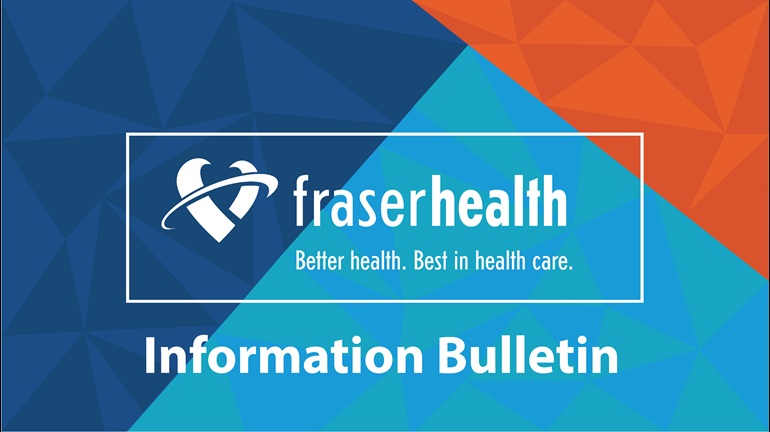
As heat continues to build in the Lower Mainland, the Heat Warning issued by Environment Canada has now been escalated to an Extreme Heat Alert.
Record-high temperatures expected in the Lower Mainland tomorrow will continue until at least Tuesday, June 29, 2021, with daytime highs ranging from 29 to 39 degrees celsius combined with overnight lows of 18 to 21 degrees celsius. Humidex values during this period will reach the high 30s to possibly the low 40s. High temperatures are historically associated with an increase in deaths among Lower Mainland residents.
While everyone is at risk of heat related illness, hot temperatures can be especially dangerous for the young, the elderly, those working or exercising in the heat, persons with chronic heart and lung con-ditions, persons with mental illness, people living alone and people experiencing homelessness. If you are taking medication, particularly for mental illness, ask your doctor or pharmacist if it increases your health risk in the heat and follow their recommendations.
The Lower Mainland Medical Health Officers for Fraser Health and Vancouver Coastal Health advise at this time that risks from extreme heat exceed risks from COVID-19. While the Extreme Heat Alert is in place:
- Cooling centres will be open, and no one should be denied access to these centres because of concerns about crowding or physical distancing.
- If people are wearing a mask and have difficulty breathing, they should remove the mask, whether they are indoors or outside, as wearing a mask may impact thermal regulation during heat events.
Coping with the heat
There are a variety of mild to severe symptoms linked with heat-related illness, including thirst, dizziness, confusion, weakness and fainting or collapsing. Medical Health Officers remind Lower Mainland residents to take precautions to protect themselves from the heat, including:
Stay hydrated
- Drink cool non-alcoholic beverages (preferably water) irrespective of your activity intake. Don’t wait until you are thirsty.
- If your doctor generally limits the amount of fluid you drink or has you on water pills, ask about increasing the amount of water you can drink while the weather is hot.
Keep cool
- NEVER leave children or pets alone in a parked car. Temperatures can rise to 52°C (125°F) within 20 minutes in an enclosed vehicle when the outside temperature is 34°C (93°F). Leaving the car windows slightly open or "cracked" will not keep the inside of the vehicle at a safe temperature.
-
Seek out an air-conditioned facility (such as a shopping centre, library, community centre or restaurant).
-
Use public splash pools, water parks or pools or take a cool bath or shower.
-
At current temperatures, fans alone are not effective. Applying cool water mist or wet towels prior to sitting in front of a fan is a quick way to cool off.
-
Dress for the weather by wearing loose, light-weight clothing. Protect yourself from the sun by wearing a wide-brimmed hat and sunglasses.
-
Keep your home cool. Open windows, close shades, use an air conditioner (if you have one) and prepare meals that do not require an oven.
-
Avoid sunburn, stay in the shade or use sunscreen with SPF 15 or more.
-
Avoid tiring work or exercise in the heat. If you must exercise, drink two to four glasses of non-alcoholic fluids each hour. Limit day time outdoor activity to early morning and evening.
Check in on others
- People living alone are at high risk of severe heat related illness. Check regularly on older people, and those who are unable to leave their homes, for signs of heat-related illness.
- Ask whether people know how to prevent heat-related illness and are doing the same.
- If others are unwell, move them to a cool shady spot, help them get hydrated and call for medical assistance if appropriate.
Get informed
- Listen to local news and weather channels.
- For more information on heat-related illness, call HealthLink BC at 811.
Vancouver Coastal Health is responsible for the delivery of $4.1 billion in community, hospital and long-term care to more than one million people in communities including Richmond, Vancouver, the North Shore, Sunshine Coast, Sea to Sky corridor, Powell River, Bella Bella and Bella Coola. VCH also provides specialized care and services for people throughout B.C., and is the province's hub of health-care education and research.
Fraser Health is responsible for the delivery of hospital and community-based health services to over 1.8 million people in 20 diverse communities from Burnaby to Fraser Canyon on the traditional territories of the Coast Salish and Nlaka’pamux Nations. Our team of nearly 40,000 staff, medical staff and volunteers is dedicated to serving our patients, families and communities to deliver on our vision: Better health, best in health care.
For media inquiries, please contact:
media@fraserhealth.ca
